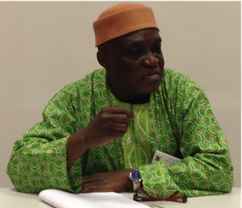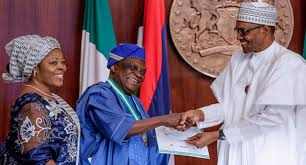Winning Nigeria’s highest and most prestigious prize for distinguished academics and intellectuals, who have made outstanding contributions to the country’s development, was a defining achievement for Professor Olufemi Obafemi, who turned 70 on Saturday, 4th April, 2020. 
Naturally, his citation when he won the Nigerian National Order of Merit (NNOM) Award in 2018 described him in impressive terms: “Olu Obafemi is a multi-talented and many-sided personality. Playwright, poet, novelist, scholar, teacher, translator, and much more besides, he is the public intellectual par excellence, one who has exhibited throughout his turbulent career, a moral commitment to interrogate the social injustices in our nation and elsewhere, while striving to build bridges of understanding across the contentious gulfs of class, culture and race.”
Born Tuesday, 4th April, 1950, in Akutukpa Bunu, Kabba, in present-day Kogi State, he studied English at Ahmadu Bello University, Zaria, Kaduna State. He then earned a master’s degree at University of Sheffield, and a doctorate at University of Leeds, both in the UK. He returned to Nigeria in 1981 to pursue a career in academia, and has been Professor of English and Dramatic Literature at University of Ilorin, Kwara State, since 1990.
As a playwright, his published plays include Nights of a Mystical Beast (1986), The New Dawn (1986), Suicide Syndrome (1993), Naira Has No Gender (1993), The love Twirls of Adiitu-Olodumare (2016) and Iyunade (2016). His plays explore solutions to the country’s problems. As a poet, he has published a volume of poems, Songs of Hope, from which two poems were picked for the Joint Admission and Matriculation Board (JAMB) syllabus.

* Prof Obafemi receiving NNOM from President Buhari
As a scholar, his works include Nigerian Writers on the Nigerian Civil War (1992), and Contemporary Nigerian Theatre: Cultural Heritage and Social Vision (1996). He also edited New Introduction to Literature (1994), and co-edited Character Is Beauty: Redefining Yoruba Culture and Identity (2001).
Interestingly, he authored a biography of Dr. Olusegun Mimiko, a controversial former governor of Ondo State, Mimiko’s Odyssey: A Biography of Revelations (2017), which did not detract from his reputation as a serious and progressive writer. From the 1980s, he has been a columnist for several major newspapers, including The Punch, Daily Sun, Daily Trust and Thisday, through which he has argued for a better society.
“I’m a political writer,” he declared in an interview. “I have moral investment into how this nation is run. I’m compelled to participate, mediate, in the destiny of this country, in its leaders, in how not to allow our nation to be run down and even contribute to how I think our nation should be run. And these are the factors that compel me to write either in literature or in my newspaper work…”
He has been President of the Association of Nigerian Authors (ANA), which is a reflection of his commitment not only to writing but also to the world of writers, as well as Chairman of the Governing Board of National Commission for Museums and Monuments (NCMM). As President of the Nigerian Academy of Letters (NAL), the apex body of arts and literature in Nigeria, he continued on his trajectory of services to the humanities.
Obafemi’s stint as Director of Research at the National Institute of Policy and Strategic Studies (NIPSS), Kuru-Jos, further highlighted his multidimensionality. During this period, he was Member, representing NIPSS on the Governing Board of National Institute for Cultural Orientation (NICO). The result of the synergy he created with the then Executive Secretary/CEO of NICO, Dr. Barclays Foubiri Ayakoroma (BFA), was the co-editing of four books: Perspectives on Cultural Administration in Nigeria (2010), Culture, Leadership and Accountability in Nigeria (2013), Culture, Peace and National Security: The Role of Traditional Rulers and Local Government Chairmen (2013), and Culture and the Socio-Economic Transformation of the Local Government System in Nigeria (2013). His involvement in such work is also a measure of his social vision and his enthusiasm for social progress. “Most of these policies, which emanate from the work that government constantly asks the Institute to do, are hardly implemented. So, the desired impact does not seem to get through to the people,” he lamented.
He remains dynamic and relevant as a man of ideas, and is currently Chairman of the Nigerian Reproduction Rights Society of Nigeria (REPRONIG). We congratulate him, and wish him many happy returns.
© SONTA News
